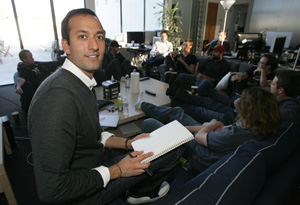
Browse the Wall Street Journal’s website and you’ll see a box near the bottom of the page that says it’s personalized just for you. If you’re a politics junkie, the box might feature articles about the last Republican debate; if you’re a techie, it might list reviews of the latest gadgets.
But it’s not the IT guys at the Wall Street Journal who are predicting what stories you will want to read, it’s a Santa Monica startup.
The company, Gravity, launched its personalization tool with the paper late last year and will add several other publishers to its customer list in coming months.
Gravity’s goal is to collect enough data on users that most of their web experience is customized to their interests.
“We’re personalizing the Internet,” said Amit Kapur, the company’s chief executive. “Every website that you go to should understand you and be able to adapt to you. We make sure that you’re seeing news that matters to you.”
Gravity is able to predict what stories WSJ readers might be interested in by accessing a computer’s cookies – Internet browsing data stored after the online session ends – to find out what articles they read recently or what links they posted on Facebook or Twitter.
A team of Gravity engineers turns that data into technology that will automatically select which articles a reader would most likely want to read. The startup’s technology can also display important articles that the person might have missed since last visiting the website.
Website personalization has been a feature at tech giants such as Los Gatos video streaming service Netflix Inc. and Seattle e-retailer Amazon Inc. Those sites offer suggestions to members on movies or products based on past purchases.
But Kapur said those companies are developing the technology internally and not selling it others. Gravity, on the other hand, is licensing its technology to web publishers that don’t have the resources to develop it, or, like the Wall Street Journal, don’t want to.
“Right now (big companies) tend to focus on their own sites, and it’s very much contained to their own products,” he said. “What we offer is valuable to the rest of the web that don’t have the engineers and the know-how.”
Personalizing web
Kapur founded Gravity in 2009 after spending several years at Myspace in Beverly Hills, most recently as the social network’s chief operating officer. His co-founders, Jim Benedetto and Steve Pearman, were also senior Myspace employees.
The trio considered moving up to Silicon Valley to start their venture, but chose to remain in Los Angeles.
In a region known for tech companies that create content, sell products online or broker advertising, a data analytics company such as Gravity stands out from the crowd, said David Young, a partner representing emerging companies in the Century City office of law firm DLA Piper.
“The companies in Los Angeles have generally been focused more on commerce or advertising or content,” Young said. “In Silicon Valley, you see teams that take a deep technical focus.”
But Kapur said the company hasn’t felt any negative effects of establishing itself in Los Angeles. Gravity is backed by Redpoint Ventures, a Silicon Valley firm that has an L.A. office, and August Capital, which is based in Menlo Park. And the company has grown from its original three founders to 19 employees.
More than half of Gravity’s team is made up of engineers and product developers. They’ve been tasked with personalizing Internet sites by mapping a person’s online “interest graph” – a history of what people care about.
The co-founders first planned to create a website where people could engage in conversations about shared interests. The goal was to generate enough data about participants to map their interest graphs. But they realized that publishers such as the WSJ already have data about their readers. So helping them use it would be a better approach.
“We wanted to be one of the companies that would help you take advantage of that large data that already exists online,” Kapur said.
It took two years before Kapur and his partners were ready to launch Gravity with its first set of customers, including the WSJ. The company is also working with New York publisher Time Inc. and San Francisco social publishing company Scribd on customization projects.
With thousands of publishers on the web, from national publications to niche blogs, Gravity has the potential for a large customer base. It is also considering expanding to e-commerce companies and daily-deal sites.
Currently, the startup charges a licensing fee for a publisher to use its technology so the publisher can see whether readers are responding to the personalization.
The company also plans to start selling advertising for its publishers based on the targeted information it has about each user.
Because Gravity’s technology relies on detailed information about people’s Internet history, the company runs the risk of raising privacy concerns. To address those issues, Gravity allows users to turn off the service.
But Young of DLA Piper said most people are willing to give away some personal information in exchange for a better experience.
“A lot of people find a more enjoyable experience if they’re getting information that’s relevant to them,” he said.
